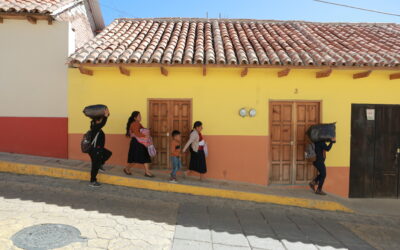Magdalena is a strong and motivated woman who lives in a mountainous, rural area outside of Nuhala Guatemala. For most of her life, Magdalena’s family has kept her at home, creating a dynamic of dependence in a community with a strong stigma against people with disabilities. From time to time, she’s been able to earn some money doing some low wage, contract weaving work for an aunt. Although she has a wheelchair, her mobility and access to economic opportunity are significantly restricted by the hilly terrain and social dynamics around her home. Trickle Up works to inspire and support the poorest and most vulnerable to build sustainable livelihoods and take their first transformative steps out of ultra poverty. With the right tools, seed capital to start a small enterprise, the knowledge to use it productively, social connections with one another, and self confidence, women living in ultra poverty can build brighter futures for themselves and their families. Magdalena is one of 320 participants of Trickle Up’s microenterprise opportunities for people with disabilities program.
Since 2010, Trickle Up has been implementing a USAID funded project with people with disabilities in rural areas of Guatemala where NGO’s, government programs, and other initiatives generally don’t include women like Magdalena and their families.
Mentoring and training from Trickle Up’s partner staff helps participants with disabilities build livelihoods that generate income. Through this process, participants confidence grows and they’re able to lead more autonomous lives. For most participants, engaging in productive activities not only improves their economic situation but also their position within their household and community as family members see and value their contributions.
Through their business relationships and savings groups activities Trickle Up participants become visible, capable members of their communities, helping to foster a greater acceptance of disability.
When we visited Magdalena a few months ago, she was sitting on the dirt floor of her home with a loom strapped around her waist, and emerging from her diligent work, a brilliant blue weaving with the image of a lion. With her own thread she is currently weaving and selling clothing to buyers that frequent her community. Her earnings are steadier and significantly greater than the sporadic contract work she had before.
But Magdalena is not satisfied. Her long term plan is to save enough to buy the food cart she wants and employ the help she needs to grow. With clear goals and the confidence to achieve them, Magdalena’s transformation speaks to her singular drive to better her circumstances and her overarcing dream of independence.
Trickle Up thanks the United States Agency for International Development and the American people for their generosity and support.


